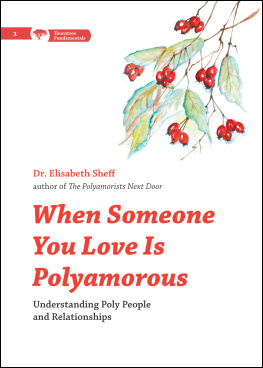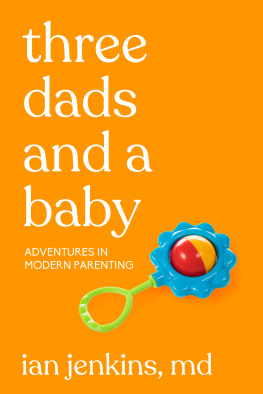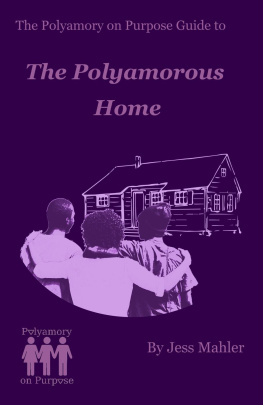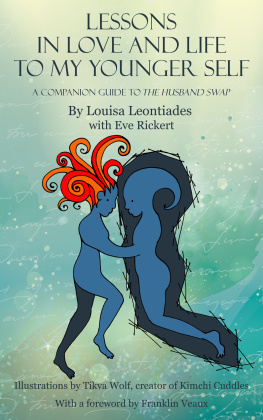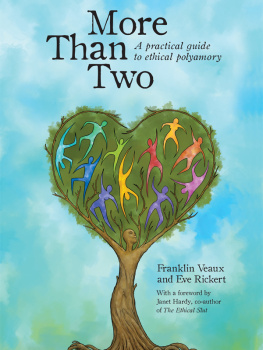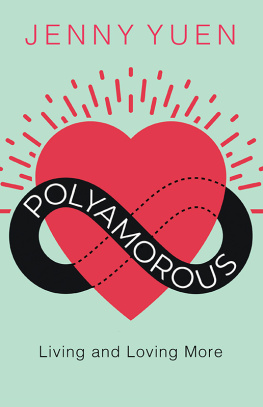When Someone You Love Is Polyamorous
Also by Elisabeth Sheff
Stories From the Polycule: Real Life in Polyamorous Families
Thorntree Press, 2015
The Polyamorists Next Door: Inside Multiple-Partner Relationships and Families
Rowman & Littlefield, 2013
When Someone You Love Is Polyamorous
Understanding Poly People and Relationships
Dr. Elisabeth Sheff

When Someone You Love Is Polyamorous
Understanding Poly People and Relationships
Copyright 2016 by Elisabeth Sheff
All rights reserved. No part of this book may be used or reproduced in any manner whatsoever without written permission from the publisher except in the case of brief quotations in critical articles and reviews.
Thorntree Press, LLC
P.O. Box 301231
Portland, OR 97294
press@thorntreepress.com
Cover photo/illustration vilaxlt/Depositphotos.com
Cover design by Jeff Werner
E-book design by Amy Haagsma
Substantive editing by Roma Ilnyckyj
Copy-editing by Eve Rickert
Proofreading by Roma Ilnyckyj
Library of Congress Cataloging-in-Publication Data
Names: Sheff, Elisabeth, 1969- author.
Title: When someone you love is polyamorous : understanding poly people and relationships / Dr. Elisabeth Sheff.
Description: Portland, OR : Thorntree Press, [2016]
Identifiers: LCCN 2016011559 (print) | LCCN 2016015650 (ebook) | ISBN 9780996460187 (pbk.) | ISBN 9780996460194 (Epub) | ISBN 9781944934101 (Kindle)
Subjects: LCSH: Non-monogamous relationships. | Open marriage. | Sexual ethics.
Classification: LCC HQ980 .S533 2016 (print) | LCC HQ980 (ebook) | DDC 306.84/23--dc23
LC record available at https://lccn.loc.gov/2016011559
Introduction
Hello, Im Dr. Elisabeth Sheff, a sociologist and expert on non-traditional relationships. Ill be your guide to learning about polyamory.
Ive spent many years studying and presenting on polyamory, and people at my lectures tend to have the same questions: How does polyamory work? What does it mean for women? How will this affect my loved ones? What about kids? My research has provided some of the answers to these questions. In addition, a growing number of books on polyamorous relationships offer insights, and a great deal of information is available online. At the end of the pamphlet, Ive listed some resources that can help you find out more.
The information in this pamphlet comes from my study of polyamorous families with children. I interviewed 133 people (including 22 children between ages 5 and 17) over the course of 15 years, from 1996 to 2012. The people in my study were the ones who continued to think of themselves as polyamorous and choose polyamorous relationships, so my data reflect the more optimistic side of polyamory, because it comes from people in (mostly) happy poly families, rather than those who may have tried polyamory and found it didnt work for them. Even so, my findings paint a fairly accurate picture of the ups and downs of daily life in these functional poly families.
I myself am monogamous. When I first learned of the idea of polyamory, I was initially quite bewildered. But over the years, I have come to see it as a legitimate choice that can work very well for people who are honest and communicate with their families best interests at heart. It doesnt work for me, and it may not work for you. But I have seen it in action and believe that it can create a tremendously loving and happy family life for those who choose it. I hope the information in this pamphlet will be useful as you begin a conversation about polyamory with your loved one.
What is polyamory?
Polyamory is one form of consensual non-monogamy. Consensual non-monogamy is an umbrella term for any relationship type in which people are not monogamous. Polyamory emphasizes emotional connection between or among more than two romantic partners who know about (and might even like) each other.
You can see the glossary for a list of polyamory-related terms, but here are a few important words to get us started:
- polyamorist: a person who has polyamorous relationships
- a short form of the word polyamorist
- an adjective to describe something that has polyamorous qualities (a poly person or a poly relationship)
- an umbrella term for several different types of non-monogamous relationships
To better understand polyamory, its helpful to take a look at what it is not. Polyamory is not
For everyone. Polyamory can be a complex and intense relationship style that takes time and devotion to maintain. Many people prefer the simplicity, security, and exclusivity of monogamy.
Cheating. In polyamorous relationships, everyone is (ideally) aware of the other partners. Relationships have been negotiated with agreements to handle issues like scheduling and safer sex.
Swinging. Swinging tends to focus on sexual variety and puts less emphasis on emotional intimacy with people outside a core couple. Some swingers forbid emotional connection, or even repeated interaction with the same outside lover.
Polygamy. In polygamy, people are married to more than one person. Polyamorists are not always married. Even more importantly, polygamy is almost always practiced as polygyny, or one man married to multiple women. Usually in those relationships, the women are not allowed to have other male partners, or to have sex with each other. Most polyamorous relationships, in contrast, allow people of all genders to have multiple partners.
Sex addiction. Poly people spend a lot more time communicating about their feelings than they do having sex. For someone whose primary motivation is sex, there are far easier ways to get it than becoming polyamorous.
Group sex. Most often, poly people interact sexually only in pairs.
Do people choose to be poly?
For some people, polyamory is a sexual orientation. For others, it is a lifestyle.
People who experience polyamory as a sexual orientation describe themselves as being wired that way. These people say that they have always been oriented toward multiple people in many ways:
- They often did not have a single best friend when they were growing up, but tended to socialize in groups.
- They find it hard to stay in monogamous relationships.
- They felt trapped in monogamous relationships, or they cheated until they stopped making agreements to be monogamous.
- They literally cannot imagine being comfortable in a monogamous relationship.
Folks who are poly by orientation will most likely be in some form of open relationship for the rest of their lives. When people with a poly orientation talk about how they feel in a monogamous relationship, they compare it to wearing shoes that are three sizes too small, or a lesbian trying to be happy in a romantic relationship with a man. They might be able to force themselves into that situation for a while, but it is not sustainable for them without a lot of pain and eventual damage.
For people who experience polyamory as a choice, there is much more flexibility for them to find fulfillment in a range of relationship styles. Some poly-as-lifestyle folks choose to be polyamorous for a portion of their lives: while they are young and do not have children; after a divorce, when they want to play the field in an open and honest way; or after their kids have moved out and they feel more freedom to experiment with their sexuality. Some people who see polyamory as a lifestyle option choose it for personal and political reasons as a permanent lifestyle, and others go in and out of it depending on what else is happening in their lives.
Next page
